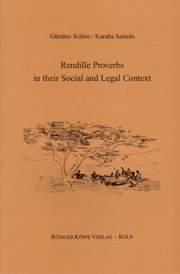Rendille Proverbs in their Social and Legal Context

AutorIn
by Günther Schlee and Karaba Sahado
Verlag
Köln: Rüdiger Köppe Verlag, 2003
Jahr der Veröffentlichung
2003
ISBN
3-89645-271-1
OPAC
Abstract
The Rendille are a group of pastoral nomads who inhabit a large area of the arid north of Kenya, east of the Ndoto Mountains and Lake Turkana and mainly to the west of Marsabit. They mostly raise camels and smallstock. Keeping cattle is risky in the harsh conditions which prevail here. In recent decades, Rendille have settled as farmers on Marsabit Mountain and gone as labour migrants as far as Nairobi and beyond. According to the 1979 census they numbered 21,794 persons, and this number is steadily growing, although population growth might be lower than in some other parts of Kenya. They speak a language which is closely related to Somali. Rendille proverbs, like proverbs elsewhere, are often quoted to underline a legal argument, but they are mostly not coined to fit the legal context specifically and much less so a specific legal application.
More than 1,000 proverbs in the Rendille language were collected together with Karaba Sahado, a Rendille singer and poet who sometimes sells cassettes to the local programme in Rendille of Voice of Kenya radio station. Sahado occasionally uses proverbs for his song lyrics and shares my interest in the documentation and analysis of the shortest genre of ‘oral-literature’. The description and explanation of these proverbs to a European audience is made difficult by the linguistic distance between Rendille and European languages and by the strangeness of the cultural context from which these proverbs stem and to which they refer in multiple ways. Therefore linguistic as well as ethnographic explanations are required in order to transmit some understanding of their meaning.
In as far as linguistic transmission is concerned, we have applied a largely standardised method: the proverbs are (1.) submitted to a morpheme analysis, (2.) translated morpheme-by-morpheme and (3.) translated according to the standards of the target language, English. If the combination of these levels of translation does not adequately convey the meaning of the proverbs, then (4.) further paraphrases referring to the ‘meaning’ are given. Besides this, occasional lexical or grammatical explanations are given. The relatively broad rift between source and target language has made a translation which consists of several steps necessary, as it cannot be bridged in one single translation.
Communication is the stuff society is made of, and proverbs with their important rhetorical functions are at the core of social life. Also their subject matter is social. They recommend or criticise certain types of social conduct. A mere glance at the index at the end of the book, shows the frequency of value-laden concepts like elderhood (v. ‘elders’) or ‘respect’, in Rendille interestingly a Samburu loanword, inkaanyit.
All proverbs have a latent legal meaning and all c a n be used in a legal context. Many proverbs discussed or the examples given to explain them have quite explicit legal referents.
